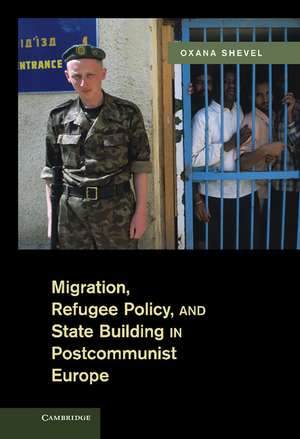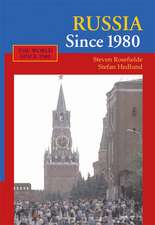Migration, Refugee Policy, and State Building in Postcommunist Europe
Autor Oxana Shevelen Limba Engleză Hardback – 23 oct 2011
Preț: 792.77 lei
Preț vechi: 921.83 lei
-14% Nou
Puncte Express: 1189
Preț estimativ în valută:
151.69€ • 158.81$ • 125.52£
151.69€ • 158.81$ • 125.52£
Carte tipărită la comandă
Livrare economică 05-19 aprilie
Preluare comenzi: 021 569.72.76
Specificații
ISBN-13: 9780521764797
ISBN-10: 0521764793
Pagini: 304
Ilustrații: 2 b/w illus. 25 tables
Dimensiuni: 156 x 234 x 21 mm
Greutate: 0.61 kg
Ediția:New.
Editura: Cambridge University Press
Colecția Cambridge University Press
Locul publicării:New York, United States
ISBN-10: 0521764793
Pagini: 304
Ilustrații: 2 b/w illus. 25 tables
Dimensiuni: 156 x 234 x 21 mm
Greutate: 0.61 kg
Ediția:New.
Editura: Cambridge University Press
Colecția Cambridge University Press
Locul publicării:New York, United States
Cuprins
1. Introduction: postcommunism, nationalism, and refugees; 2. A theory of refugee politics in 'contested' and 'uncontested' postcommunist states; 3. Refugee policy in the Russian Federation; 4. Refugee policy in Ukraine; 5. Refugee policy in the Czech Republic; 6. Refugee policy in Poland; 7. Conclusion.
Recenzii
“This nuanced account of immigration policy in Eastern Europe shows how crucibles of nationalism can, in the presence of vigorous political contestation, produce liberal and inclusive policies. Shevel’s meticulously researched analysis will be of interest to students and scholars of Eastern Europe and should attract the attention of policymakers and participants in debates about immigration on both sides of the Atlantic.”
– Jessica Pisano, University of Ottawa
“Shevel has broken new ground in how we should understand the relationship between nationalism and how states treat migrants and refugees. Her impressive case studies, drawing on original sources in four languages plus English, also bring important lessons for how international organizations might best promote progressive domestic policy change.”
– Henry Hale, The George Washington University
“Oxana Shevel has written an engaging book that breaks new theoretical and empirical ground. Based on meticulous fieldwork and careful comparisons, she develops a clear and compelling argument that accounts for why post-communist states vary widely in terms of their receptivity to refugees. This book makes important contributions to the fields of post-communist studies, migration, and nationalism.”
– Marc Morjé Howard, Georgetown University
“Shevel’s book not only expands our understanding of national building within post-communist regimes, it highlights the need for new interdisciplinary discussions concerning the interpretations of core analytical terms such as refugee, citizenship, and ethnicity. In exploring four unique national paths in the development and institutionalization of refugee policies, she provides richly detailed insights into how post-communist regimes negotiate adherence to international standards and relate to intergovernmental agencies such as the United Nations High Commissioner for Refugees (UNHCR), while balancing internal political concerns, future international ambitions, and the complex weight of history. Providing needed insight into global issues of refugee recognition, integrating a masterful review of literatures, and in-depth fieldwork in the Czech Republic, Poland, Ukraine and the Russian Federation, this is a valuable work of timely interest to economists, sociologists and demographers.”
– Cynthia J. Buckley, University of Texas, Austin; Program Director, The Social Science Research Council
– Jessica Pisano, University of Ottawa
“Shevel has broken new ground in how we should understand the relationship between nationalism and how states treat migrants and refugees. Her impressive case studies, drawing on original sources in four languages plus English, also bring important lessons for how international organizations might best promote progressive domestic policy change.”
– Henry Hale, The George Washington University
“Oxana Shevel has written an engaging book that breaks new theoretical and empirical ground. Based on meticulous fieldwork and careful comparisons, she develops a clear and compelling argument that accounts for why post-communist states vary widely in terms of their receptivity to refugees. This book makes important contributions to the fields of post-communist studies, migration, and nationalism.”
– Marc Morjé Howard, Georgetown University
“Shevel’s book not only expands our understanding of national building within post-communist regimes, it highlights the need for new interdisciplinary discussions concerning the interpretations of core analytical terms such as refugee, citizenship, and ethnicity. In exploring four unique national paths in the development and institutionalization of refugee policies, she provides richly detailed insights into how post-communist regimes negotiate adherence to international standards and relate to intergovernmental agencies such as the United Nations High Commissioner for Refugees (UNHCR), while balancing internal political concerns, future international ambitions, and the complex weight of history. Providing needed insight into global issues of refugee recognition, integrating a masterful review of literatures, and in-depth fieldwork in the Czech Republic, Poland, Ukraine and the Russian Federation, this is a valuable work of timely interest to economists, sociologists and demographers.”
– Cynthia J. Buckley, University of Texas, Austin; Program Director, The Social Science Research Council
Notă biografică
Descriere
This book is the first systematic comparative analysis explaining why similar postcommunist states vary in their receptivity to refugees.














